Roger Thomas Ames, Humanities Chair Professor at Peking University, Professor Emeritus of Philosophy at University of Hawaii at Manoa [Photo provided to chinadaily.com.cn]
From its origins in the prehistoric past, an ever-evolving Chinese culture has been unique among the world's civilizations, Professor Roger T. Ames said at a recent forum on Chinese culture.
He attributed this unbroken continuity to family reverence, one of the most basic and defining values of the Chinese people, in an interview with Xinhua after the morning session of the forum.
It's each generation taking the responsibility for inheriting the culture, for understanding the culture, for expanding the culture, for using the culture to address the problems of the day, said Ames, who has delved into comparative studies of Chinese and Western philosophy for decades.
"Dao (the Way) isn't something that is given. It's something that we have to participate in generation after generation," said Ames.
Born in 1947 in Canada, Ames was interested in writing poetry and studied at Redlands University, California, the United States. Through an exchange program, he went to Hong Kong.
Recalling his time in Hong Kong, Ames said the impact on him has proved lifelong. "I'm still trying to figure out the world that I encountered in Hong Kong. And I'm still trying to understand that world."
Under the guidance of Confucian masters such as Lao Siguang, a completely new world of Chinese philosophy suddenly opened up right before his eyes. Ames decided on an academic focus of conducting comparative research into Chinese and Western philosophies.
Following years of training at universities including University of London, Ames moved to the Hawaiian Islands in 1978 and took a post in the University of Hawaii's Department of Philosophy.
Unlike in the Western world, the idea of life is really what generates growth in the Chinese world, said the philosophy professor emeritus of the University of Hawaii at Manoa. "(Be it) Chinese morality, education, (or) beauty, everything is about growth."
The world is facing challenges including global warming, environmental degradation, food and water shortages, and proxy wars. For Ames, all these problems cannot be resolved by a single country or force. "We can only solve them if we work on them together."
In an interdependent world, the most important contribution of Confucianism is perhaps the idea that to achieve success, one should let others succeed as well, said Ames, who is vice chairman of the International Confucian Association.
Ames said that if in your mind there's some kind of absolute standard, and you think that you have it, then you are exclusive. The Chinese tradition, on the contrary, is inclusive. "The idea of He (Harmony) begins from difference, not from sameness."
The 76-year-old said his interest in Chinese philosophy is not to celebrate China. Rather, it is to help the world survive. "For the next generation, for my grandchildren, I want a better world."
Ames is humanities chair professor at Peking University. He had a three-hour seminar with graduates at the university later that afternoon.
"I'm teaching the next generation of young professors a framework, a language, and a methodology for taking China's very own Confucianism to the world," he said, adding that foreign Confucianism is not Chinese Confucianism.
Ames also called for greater people-to-people exchanges between China and the United States, saying that unbalanced people-to-people exchanges before the pandemic had led to a huge gap in understanding.
The philosopher said that his favorite Chinese saying is that the greatest capacity of the cosmos is life, an adage from a classical commentary to the millennia-old "I Ching," or the "Book of Change." This is profound, he said.
Source:
Xinhua News Agency
